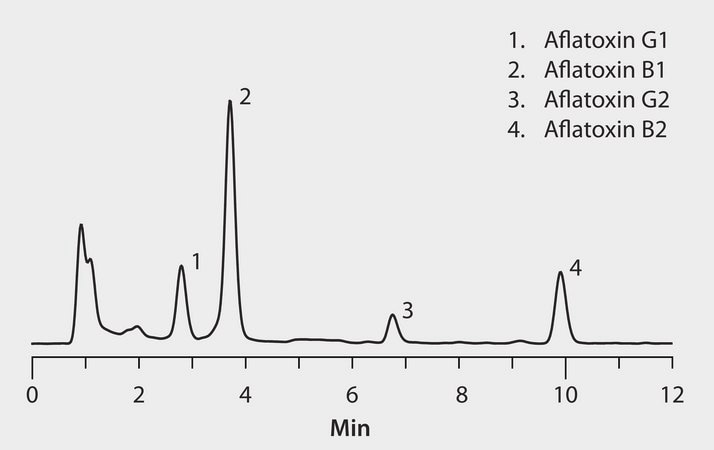HPLC Analysis of Aflatoxins B1, B2, G1 and G2 in Corn on Ascentis® Express C18 after SPE using Supel™ Tox AflaZea and Fluorescence Detection

Materials
analytical column
CONDITIONS
sample preparation
SPE (Solid Phase Extraction)
sample/matrix
25 g corn meal in 100 mL acetonitrile:water (84:16)
SPE tube/cartridge
Supel™ Tox AflaZea, 6 mL (55314-U)
sample addition
2 mL
elution
collect sample in 5 mL silanized glass vial
eluate post-treatment
transfer 200 μL sample, add 300 μL TFA derivatization solution (70:20:10 water:TFA:acetic acid), heat in microreactor 20 min at 65 °C, cool, add 580 μL deionized water, vortex
column
Ascentis Express C18, 15 cm x 2.1 mm I.D., 2.7 μm particles (53825-U)
mobile phase
[A] water; [B] acetonitrile; (80:20, A:B)
flow rate
0.350 mL/min
pressure
325 psi (22.4 bar)
column temp.
35 °C
detector
fluorescence, ex 360 nm, em 440 nm
injection
20 μL
Description
Analysis Note
Aflatoxins are closely related compounds produced as secondary metablolites of fungi. They are found in grains and nuts like corn, wheat or peanuts. Shown here is a rapid, sensitive method to extract these compounds from corn using SPE cartridges specifically designed for aflatoxins, Supel Tox AflaZea (aflatoxin zearalenone), which removes interferences from grains, feeds, TMR samples, peanuts, peanut products and aqueous solutions. Analysis was via HPLC on Ascentis Express Fused-Core C18 colums.
Legal Information
Ascentis is a registered trademark of Merck KGaA, Darmstadt, Germany
Supel is a trademark of Sigma-Aldrich Co. LLC